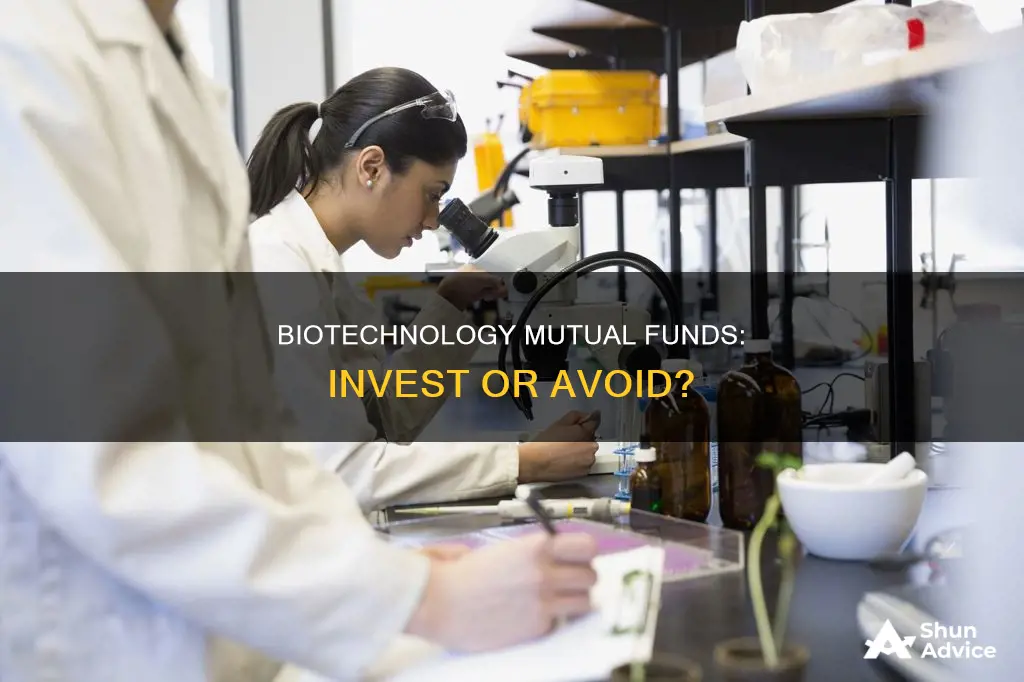
Investing in biotechnology mutual funds can be a great way to gain exposure to the biotech sector, which has seen explosive growth in recent years, particularly due to the COVID-19 pandemic. Biotechnology companies use living organisms and molecular biology to produce a broad range of products, including medicines and pharmaceuticals. While investing in individual biotech stocks can be risky, mutual funds provide a diversified way to invest in this volatile industry. By investing in mutual funds, you can minimise costs while investing in a broad range of stocks across biotech, pharmaceuticals, and healthcare. This way, you can lower your risk level and portfolio volatility.
| Characteristics | Values |
|---|---|
| Risk | High |
| Reward | High |
| Diversification | High |
| Cost | Low |
| Management | Professionally managed |
| Performance | Mixed |
What You'll Learn

What are biotechnology mutual funds?
Biotechnology mutual funds provide professionally managed exposure to the biotech sector. They help minimize costs while investing in a broad range of stocks in biotech, pharmaceuticals, and healthcare.
Biotechnology companies use living organisms and molecular biology to produce a broad range of products, including medicines and pharmaceuticals. The biotechnology sector attracted heightened attention in 2021 as the industry produced emerging vaccines, treatments, and biomedical devices to address the global COVID-19 pandemic. As a result, some of these companies have seen explosive revenue and profit growth.
Well-known biotechnology companies include Moderna Inc. (MRNA), Agios Pharmaceuticals Inc. (AGIO), and CRISPR Therapeutics A.G. (CRSP).
Biotechnology mutual funds can be a good investment option for investors who expect biotech companies to continue growing. These funds allow investors to gain exposure to the biotech sector without needing deep expertise in the biomedical fields. The funds are run by professional money managers who have the time to track the space and keep tabs on each of the healthcare stocks within their portfolios.
When choosing a biotechnology mutual fund, there are four main areas to focus on: fee structure, methodology, liquidity, and portfolio holdings. With fees, it is generally better to keep expense ratios low, ideally no higher than 0.75%.
In terms of methodology, passively managed ETFs are usually cheaper, but it is important to consider how the index weights its constituents. Market-capitalization-weighted indexes give higher weight to larger companies, resulting in a lower-volatility portfolio but more muted upside. On the other hand, equal-weighted portfolios give the same weight to small and large companies, leading to more upside potential but also higher volatility.
To ensure liquidity, look for funds with at least $1 billion in assets under management and trading volumes of over 100,000 per day on average.
When analyzing portfolio holdings, consider big collaborations that will allow for larger research and development budgets, as well as the company's clinical trial historical data success and cash available for research.
Some examples of biotechnology mutual funds include:
- Fidelity Advisor Biotechnology Fund Class A (FBTAX)
- Fidelity Select Biotechnology Portfolio (FBIOX)
- Franklin Biotechnology Discovery Fund Class A (FBDIX)
- IShares Biotechnology ETF (IBB)
- SPDR S&P Biotech ETF (XBI)
- ARK Genomic Revolution ETF (ARKG)
Class C Mutual Funds: When to Invest and Why
You may want to see also

What are the risks?
Investing in biotechnology mutual funds carries a certain level of risk that prospective investors should be aware of. Here are some of the key risks associated with investing in this sector:
High Risk, High Reward
The biotech industry is known for its cyclical, high-risk, and high-reward nature. The success of biotech companies largely depends on their ability to develop successful drugs, which requires significant investment in research and development (R&D). The failure of a drug candidate or lack of approval can be catastrophic for a company, potentially wiping out its equity value. This high risk of failure makes picking individual biotech companies that will succeed very challenging and risky. As a result, many companies may fail along the way, even as the industry as a whole makes advancements and develops newer treatments.
Volatility and Uncertainty
The biotech industry is subject to significant volatility and uncertainty. The success of drug development efforts is uncertain, and clinical trials can take years to complete. During slow periods, companies may need to downsize and restructure to preserve capital for R&D. The cost of capital can be high, and cost savings become crucial when breakthroughs or new drug approvals are not immediately achieved.
Limited Revenues and Commercialized Products
Biotechnology firms often have limited revenues, if any, from commercialized products. A significant portion of their market performance is based on the development of investigational treatments, and only a small percentage of drugs that enter clinical trials are expected to reach the market. This dynamic can make it challenging to predict the financial performance of individual companies or the industry as a whole.
Impact of Interest Rates and Economic Conditions
Economic conditions and interest rates can influence the performance of biotech companies. For example, expectations for rate cuts being pushed back can create challenges for the industry. Additionally, the high cost of capital and the need to allocate resources to R&D can make biotech companies sensitive to changes in economic conditions and interest rate environments.
Regulatory and Approval Challenges
Biotech companies must navigate complex regulatory landscapes and stringent approval processes. The path from drug development to commercialization can be lengthy and fraught with challenges. Regulatory hurdles and delays in approvals can impact a company's financial performance and investor sentiment.
Competition and Rapid Technological Changes
The biotech industry is highly competitive, with constant advancements and innovations. Companies must keep up with technological changes and compete with both established firms and emerging startups. This dynamic can lead to rapid shifts in market positions and investor preferences.
A Simple Guide to Investing in the Nasdaq 100 Index Fund
You may want to see also

What are the benefits?
Investing in biotechnology mutual funds can be a good idea for several reasons. Here are some of the key benefits:
Diversification of Risk
Biotechnology companies are often risky investments due to the high research and development costs and long development timelines. By investing in mutual funds, you can diversify your risk across multiple companies, reducing the impact of any single company's failure. This diversification is a significant advantage, as it lowers the potential downside of investing in the biotech sector.
Professional Management
Biotechnology mutual funds are managed by professionals who have the expertise and time to closely monitor the industry and individual companies. They can make informed decisions about which companies to invest in, when to buy or sell, and how to optimize the fund's performance. This can be especially beneficial for investors who don't have the time or expertise to deeply analyse the biotech sector.
Exposure to Innovative Companies
Biotechnology is an exciting and fast-growing sector, with companies working on innovative therapies, treatments, and vaccines. Investing in mutual funds allows you to gain exposure to these cutting-edge companies, which could potentially deliver substantial returns. The COVID-19 pandemic highlighted the importance of the biotech industry, and it continues to attract attention and investment.
Access to a Broad Range of Stocks
Biotechnology mutual funds provide access to a broad range of stocks in biotech, pharmaceuticals, and healthcare. This diversification across different companies and sectors can help minimize costs and maximize potential gains. It also allows investors to benefit from the performance of multiple companies, rather than relying on the success of just one or two individual stocks.
Potential for High Returns
While investing in biotech comes with risks, the upside potential can be significant. Successful biotech companies can deliver remarkable returns, especially those that develop and commercialize innovative treatments. By investing in mutual funds, you increase your chances of capturing these high returns while managing your risk exposure.
Overall, investing in biotechnology mutual funds offers a professionally managed, diversified, and lower-risk approach to gaining exposure to the exciting and dynamic biotech sector. It allows investors to benefit from the expertise of fund managers and the performance of multiple companies, potentially leading to higher returns over time.
What Makes Debentures Attractive for Surplus Fund Investments?
You may want to see also

How do I choose a biotechnology mutual fund?
When choosing a biotechnology mutual fund, there are several factors to consider. Here are some key points to help guide your decision:
- Risk Level and Volatility: Assess your risk tolerance and consider the risk level associated with different funds. Look at the top holdings of the fund, particularly those with the highest weightings, to gauge their risk level. Generally, larger companies with bigger market capitalisations tend to be less volatile than smaller companies.
- Diversification: Diversification is essential in mitigating risk. Biotech exchange-traded funds (ETFs) allow you to invest in a diverse range of healthcare and biotech companies with a single investment. Consider funds that invest in a mix of large, established companies and smaller, high-growth biotech firms.
- Performance and Fees: Evaluate the historical performance of the fund, including total returns over different periods. Also, consider the expense ratio, which represents the fees charged by the fund. Lower expense ratios can result in higher long-term returns.
- Investment Strategy: Different funds have different investment strategies. Some funds focus on large-cap biotech stocks, while others target small- and mid-cap stocks with higher growth potential. Decide if you want to focus on established companies or take on more risk with smaller companies.
- Top Holdings: Review the top holdings of the fund to ensure they align with your investment goals and interests. Some funds may have a higher concentration in specific companies or sectors, so make sure you are comfortable with their weightings.
- Fund Size and Assets Under Management: Larger funds tend to have more assets under management, which can provide greater stability and liquidity. However, smaller funds may offer more specialised investment opportunities.
- Fund Manager and Reputation: Research the fund manager's track record and reputation. A reputable fund manager with a successful history in the biotech sector can inspire more confidence.
- Investment Horizon: Consider your investment horizon and whether you are seeking short-term gains or long-term growth. Some funds may be better suited for short-term trading, while others are designed for long-term investment.
Remember, investing in biotechnology mutual funds carries inherent risks, and past performance does not guarantee future results. It is always advisable to conduct thorough research and consult with a financial advisor before making any investment decisions.
Christians and Mutual Funds: Ethical Investment Considerations
You may want to see also

What are the best biotechnology mutual funds to invest in?
When considering investing in biotechnology mutual funds, it's important to remember that the biotech industry is cyclical and high-risk. However, it can also be high-reward, and investing in mutual funds can help mitigate some of the risks by diversifying your portfolio.
Fidelity Advisor Biotechnology Fund Class A (FBTAX)
FBTAX is a mutual fund that invests at least 80% of its assets in companies involved in the research, development, manufacture, and distribution of biotechnological products. It has a one-year trailing return of -6.0%, an expense ratio of 1.01%, and assets under management of $2.4 billion. FBTAX's top holdings include AbbVie Inc., Regeneron Pharmaceuticals Inc., and Vertex Pharmaceuticals Inc.
Fidelity Select Biotechnology Portfolio (FBIOX)
FBIOX is another mutual fund that typically invests at least 80% of its assets in biotechnology companies. It has a one-year trailing return of -14.6%, an expense ratio of 0.70%, and assets under management of $7.0 billion. FBIOX's top holdings include Gilead Sciences Inc., Moderna, and AbbVie.
Franklin Biotechnology Discovery Fund Class A (FBDIX)
FBDIX is a mutual fund that focuses on investing in securities of biotechnology companies and discovery research firms, including those in genomics, genetic engineering, and gene therapy. It has a one-year trailing return of -19.5%, an expense ratio of 0.98%, and assets under management of $1.1 billion. FBDIX's top holdings include Regeneron Pharmaceuticals, Amgen Inc., and Horizon Therapeutics PLC.
IShares Biotechnology ETF (IBB)
IBB is an exchange-traded fund (ETF) with total assets of $9.1 billion, an expense ratio of 0.44%, and a dividend yield of 0.17%. It attempts to track the results of an index that includes all U.S.-listed stocks in the biotechnology sector and currently owns around 275 biotech stocks. IBB's top holdings include Amgen, Gilead Sciences, Moderna, Regeneron Pharmaceuticals, and Vertex Pharmaceuticals.
SPDR S&P Biotech ETF (XBI)
XBI is an ETF with total assets of $7.8 billion, an expense ratio of 0.35%, and a dividend yield of 0.23%. It seeks to track the S&P Biotechnology Select Industry Index, giving investors exposure to large-cap, mid-cap, and small-cap biotech stocks. XBI currently owns around 150 stocks, with top holdings including Madrigal Pharmaceuticals, Exact Sciences, TG Therapeutics, and Acadia Pharmaceuticals.
Ark Genomic Revolution ETF (ARKG)
ARKG is an ETF operated by Cathie Wood's Ark Invest, with total assets of $1.9 billion and an expense ratio of 0.75%. It invests in companies that incorporate genomics into their businesses, including gene-editing, molecular diagnostics, and virtual care. ARKG typically owns between 40 and 60 stocks, with top positions including Exact Sciences, Pacific Biosciences of California, Ionis Pharmaceuticals, and Teladoc Health.
First Trust NYSE Arca Biotechnology Index Fund (FBT)
FBT is an ETF with total assets of $1.55 billion and an expense ratio of 0.55%. It seeks to track the performance of the NYSE Arca Biotechnology Index, which includes equal weights of stocks from a cross-section of biotech companies, particularly those focused on genomics and monoclonal antibody technologies. FBT currently has about 30 positions, with top holdings including Agios Pharmaceuticals, Seagen, BioMarin Pharmaceutical, and Exelixis.
VanEck Biotech ETF (BBH)
BBH is an ETF with total assets of $517 million, an expense ratio of 0.35%, and a dividend yield of 0.35%. It focuses on owning the most liquid biotech companies based on market cap and trading volume, favoring larger companies in the biotech sector. BBH's portfolio includes 25 biotech stocks, with top holdings such as Amgen, Gilead Sciences, Vertex Pharmaceuticals, Moderna, and Iqvia Holdings.
Retirement Mutual Funds: Where to Invest for a Secure Future
You may want to see also
Frequently asked questions
Biotechnology mutual funds provide professionally managed exposure to the biotech sector. They help minimize costs while investing in a broad range of stocks in biotech, pharmaceuticals, and healthcare.
Investing in biotechnology mutual funds allows you to diversify your portfolio and minimize costs. It also provides access to a professionally managed portfolio of biotech, pharmaceutical, and healthcare stocks. Additionally, you can benefit from the expertise of fund managers who have the time and resources to closely track the industry and individual companies.
The biotech industry is known for its high-risk, high-reward nature. It is subject to boom-and-bust cycles, and individual companies can face significant challenges, such as high research and development costs, regulatory hurdles, and clinical trial failures. As a result, investing in biotechnology mutual funds carries the risk of volatility and potential losses if the sector or specific holdings underperform.







